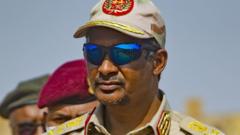How Did a Camel and Gold Seller Become a Warlord Controlling Half of Sudan?

Published: 2025-11-04 01:00:24 | Category: technology
Mohamed Hamdan Dagolo, commonly known as "Hemedti", has emerged as a central figure in Sudan's tumultuous political landscape, especially following his paramilitary Rapid Support Forces (RSF) gaining control over significant territories, including the recent capture of el-Fasher. Understanding Hemedti's rise is crucial for grasping the current dynamics of power in Sudan, where his actions are shaping both local and international responses.
Last updated: 25 October 2023 (BST)
What’s happening now
As of late October 2023, the RSF has solidified its position, controlling nearly half of Sudan amidst ongoing conflict with the Sudanese army. Following the capture of el-Fasher, the RSF’s influence has grown, leading to increased reports of violence and human rights abuses in the region. Hemedti's dual role as a military leader and a political figure is creating a precarious situation for Sudan's future stability, drawing international scrutiny and condemnation.
Key takeaways
- Hemedti’s RSF controls nearly half of Sudan, particularly in Darfur.
- The RSF has been accused of mass atrocities, including genocide.
- Hemedti is attempting to build political coalitions to strengthen his grip on power.
- International responses are varied, with significant concern over human rights violations.
- The ongoing conflict is creating a humanitarian crisis, with thousands of civilian casualties reported.
Timeline: how we got here
To understand Hemedti's rise and the ongoing conflict in Sudan, it's essential to consider the timeline of significant events:
- 2004: The Darfur conflict escalates, leading to widespread violence and the rise of the Janjaweed militia.
- 2013: Hemedti gains formal command of the RSF, a merger of the Janjaweed.
- 2019: President Omar al-Bashir is ousted, and Hemedti briefly gains popularity as a reformist figure.
- April 2023: Tensions escalate between the RSF and Sudanese army, culminating in armed conflict.
- October 2023: The RSF captures el-Fasher, further entrenching its power in Sudan.
What’s new vs what’s known
New today/this week
The RSF's recent capture of el-Fasher marks a significant tactical victory, allowing them to exert greater control over the western region of Sudan. This shift has led to a spike in violence and human rights violations, prompting international condemnation.
What was already established
Hemedti's background as a former camel trader in a marginalised community has shaped his rise to power. His transition from a local militia leader to a national power broker has been marked by opportunism and strategic alliances, particularly with foreign powers.
Impact for the UK
Consumers and households
The ongoing conflict in Sudan has implications for UK consumers, particularly regarding humanitarian aid and the potential for increased refugee flows. Families from affected regions may seek asylum, placing additional strain on UK resources.
Businesses and jobs
UK businesses operating in Sudan face significant risks due to instability, while companies involved in humanitarian efforts may find their operations hampered by ongoing violence and supply chain disruptions.
Policy and regulation
The UK government is likely to face pressure to respond to the humanitarian crisis, potentially leading to increased aid efforts or sanctions against individuals involved in human rights abuses. Discussions within the UN and other international bodies will be critical in shaping the UK's policy response.
Numbers that matter
- Estimated 15,000 civilian deaths due to the ongoing conflict, with a significant number attributed to RSF actions.
- RSF has reportedly gained control over 50% of Sudan’s territory, particularly in Darfur.
- Hemedti's paramilitary forces are believed to have received millions of dollars from foreign mercenary contracts.
- Over 1 million people displaced within Sudan due to the conflict, with many seeking refuge in neighbouring countries.
- RSF’s gold exports have reportedly made it the largest exporter in Sudan, with significant implications for the economy.
Definitions and jargon buster
- RSF: Rapid Support Forces, a paramilitary group in Sudan originally formed from the Janjaweed militia.
- Janjaweed: Arab militias involved in the Darfur conflict known for committing atrocities against non-Arab populations.
- Mercenary: A soldier hired to serve in a foreign army or engage in armed conflict for financial gain.
- Darfur: A region in western Sudan that has been the epicentre of conflict since 2003, marked by violence and humanitarian crises.
How to think about the next steps
Near term (0–4 weeks)
In the immediate future, expect continued violence as the RSF and Sudanese army remain in a state of conflict. Humanitarian needs will escalate, with international organisations calling for additional aid.
Medium term (1–6 months)
As the conflict persists, diplomatic efforts may increase, potentially leading to negotiations. However, the likelihood of Hemedti consolidating power or seeking international legitimacy remains high.
Signals to watch
- Monitoring ceasefire agreements and their enforcement.
- International responses and sanctions from the UK and EU.
- Public sentiment within Sudan, particularly in response to RSF actions.
Practical guidance
Do
- Stay informed about the situation in Sudan through reputable news sources.
- Engage in discussions about humanitarian support and advocacy for refugees.
- Monitor government policies related to Sudan and potential changes in immigration law.
Don’t
- Don’t ignore the implications of the conflict on global markets, especially regarding gold and oil.
- Don’t dismiss the humanitarian crisis as a distant issue; it affects global stability.
- Don’t fail to support organisations working on the ground in Sudan.
Checklist
- Subscribe to updates from humanitarian organisations working in Sudan.
- Follow UK government announcements regarding Sudanese policy.
- Engage with local communities that support Sudanese refugees.
- Participate in awareness campaigns about the conflict.
- Educate yourself about the historical context of Sudan's conflicts.
Risks, caveats, and uncertainties
The situation in Sudan remains fluid, with many unknowns surrounding Hemedti's ultimate ambitions and the RSF's capacity for sustained conflict. International responses may shift based on ongoing developments, and the potential for external interference complicates any resolution efforts. Moreover, the humanitarian crisis is exacerbated by logistical challenges in delivering aid, leading to speculation about the effectiveness of international interventions.
Bottom line
Hemedti's rise as a powerful player in Sudan's political arena underscores the complexity of the ongoing conflict and its ramifications for the region. With the RSF's control over key territories and resources, the future of Sudan remains uncertain, and the prospect of peace appears distant. Continued vigilance and strategic responses from the international community are critical in addressing the humanitarian crisis and stabilising the country.
FAQs
Who is Hemedti?
Hemedti, or Mohamed Hamdan Dagolo, is the leader of Sudan's Rapid Support Forces (RSF), a paramilitary group that has gained significant power in Sudan amidst ongoing conflict.
What role does the RSF play in Sudan's conflict?
The RSF is deeply involved in the current conflict, controlling major territories and accused of committing widespread human rights abuses, including genocide against civilians.
How has the international community responded to the situation in Sudan?
The international community has expressed concern over the humanitarian crisis and human rights violations, with calls for sanctions and increased humanitarian aid to affected populations.



